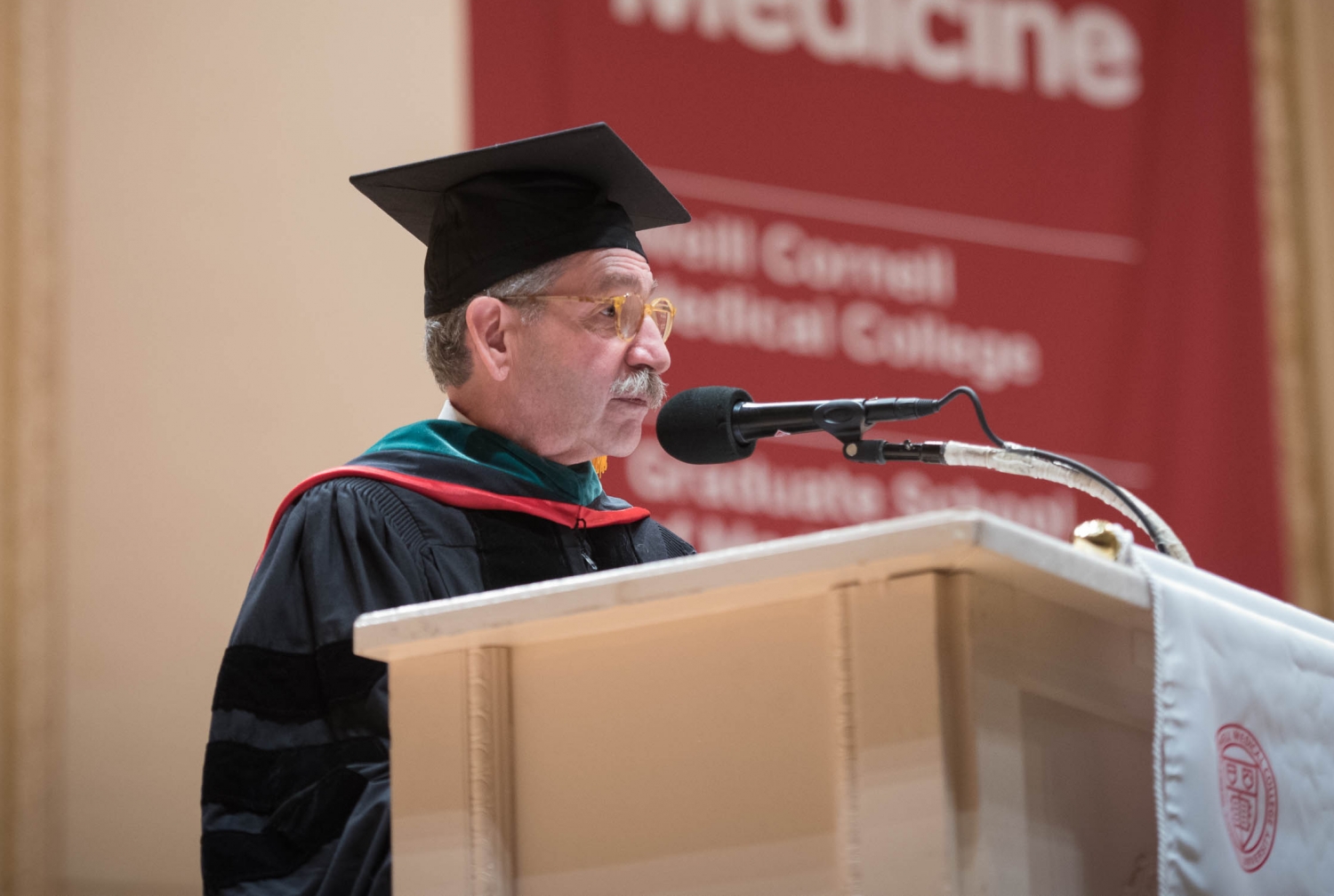A gruff Boston cop with a heart of gold. A cynical lawyer whose taste for vodka martinis gets him into trouble. A spy who knows all about the nukes in Kazakhstan. They could be characters drawn straight from the pages of a best-selling thriller — but the real detective in their stories is Dr. Stuart Mushlin, MD ’73, president of the Weill Cornell Medicine Alumni Association. In his new book, "Playing the Ponies and Other Medical Mysteries Solved," the internist reflects on their cases and many others from his more than 40 years of practice. The cop, he writes, suffered from back pain so bad it made the stoic man scream. The lawyer showed up first with a liver condition, then with a rash that Dr. Mushlin traced back to the man’s service in Vietnam. The spy had prostate cancer — and that was just the beginning of his problems.
Throughout the book’s 20 essays, Dr. Mushlin, a master clinician in internal medicine and primary care at Brigham and Women’s Hospital and an assistant professor of medicine at Harvard Medical School, presents his patients not just as cases but as people. Along with details of their conditions — ranging from rogue chromosomes to leprosy — he offers details of their lives that helped (or hindered) his efforts at diagnosis and treatment. The clear protagonist of "Playing the Ponies" though, is Dr. Mushlin himself. “This book came from the heart, and it’s my voice on the page,” he says. “I was giving up full-time practice and taking the first steps toward retirement, and I wanted to share the joy and privilege of being a doctor and having patients put their trust in you.”
In one chapter, he treats a patient with tuberculosis and reflects on how his own father’s struggle with the disease influenced his decision to become a doctor. When a woman shows up with a condition that harks back to his first-year physiology class, Dr. Mushlin remembers his time as a student at Weill Cornell Medicine in the early ’70s. Another essay describes the moonlighting gig he took at a small hospital in a blue-collar town when his young family couldn’t make ends meet. It was a chance to pick up both extra income and some hands-on lessons that went beyond his training in internal medicine — offering what he calls a “more immediate and gratifying experience” of helping those in his care, compared with advocating lifestyle changes whose benefits would accrue over the longer term. “It made me feel like a real doctor,” he writes of sewing up the scalp of a man who’d been conked over the head with a wine bottle, “one who wasn’t just trying to persuade people post heart attack to stop smoking and eat less meat.”Dr. Mushlin, who studied English as an undergraduate and once considered a PhD in literary studies, weaves his autobiography through the cases in "Playing the Ponies," which came out in March from Rutgers University Press. “I always knew that part of this book would be memoir,” he says. “In your professional life as a physician, you don’t share a lot of personal information with your patients, but your experiences are formative, just as theirs are. I wanted to show how our lives — those of my patients, and my own — are shaped by our choices as well as by our circumstances.”
Dr. Mushlin went on to enter private practice as an internist with coverage responsibilities at a community hospital, and in the book’s title essay he describes a memorable case he saw there. The patient, whom Dr. Mushlin calls S.M., had a rare blood condition that was causing neurological and kidney damage and required a then-experimental total body plasma exchange. Thanks to the young doctor’s quick thinking, the patient lived — but ultimately stiffed Dr. Mushlin on the bill. “His wife told me that they had cashed the insurance check, and both had gone to the track and played the ponies,” Dr. Mushlin writes. “They figured that S.M.’s life was pretty lousy now and I had enough money. And they never returned.”
In "Playing the Ponies," Dr. Mushlin takes readers through the question-and-answer, trial-and-error method that he’s used throughout his career. While his nickname among the staff at Brigham and Women’s Hospital is “House” — for the fictional character’s diagnostic acumen, not his misanthropic tendencies — Dr. Mushlin is the first to admit that real clinicians don’t pull answers out of the air like doctors on TV. “There’s inspiration, of course, but diagnosis is mostly perspiration and desperation,” he says. Essays with wry titles like “Thinking Can Sometimes Make a Difference” recount the exams, tests and late-night musings that have led Dr. Mushlin to the right answers — or sometimes the wrong ones. “I’ve been puzzled many times, and there are days when your fastball just isn’t as fast,” says Dr. Mushlin. “I wanted to communicate that doctors aren’t perfect. We need to learn from our mistakes and from our patients.”
Dr. Mushlin hopes that the message gets through to the lay readers — “If you like the cases in the Sunday New York Times, this book is for you,” he says — and the aspiring physicians whom he envisions as his book’s ideal audience. “I’ve always taught my clinical medicine students to listen to their patients’ stories,” Dr. Mushlin says. “Patients will keep you humble. They tell you their innermost secrets and hopes, and you never stop learning. That’s what has made being a doctor such a wonderful career.”
— C. A. Carlson
This story first appeared in Weill Cornell Medicine, Vol. 16. No. 2

